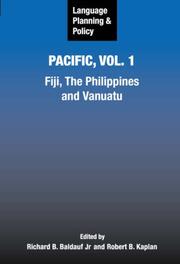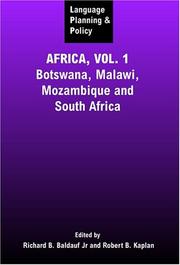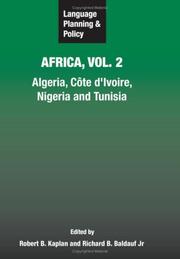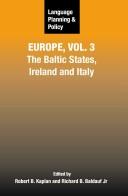| Listing 1 - 10 of 18 | << page >> |
Sort by
|
Book
ISBN: 9781800418059 Year: 1997 Publisher: Bristol Blue Ridge Summit
Abstract | Keywords | Export | Availability | Bookmark
 Loading...
Loading...Choose an application
- Reference Manager
- EndNote
- RefWorks (Direct export to RefWorks)
Reviewing the field of language policy and planning, this text sets out current practice and ways of thinking about language policy and planning, looking at methodology and the key areas of education, literacy and economics. Case studies of key language planning and policy issues are included.
Digital
ISBN: 9781800418059 Year: 1997 Publisher: Bristol ;; Blue Ridge Summit Multilingual Matters
Abstract | Keywords | Export | Availability | Bookmark
 Loading...
Loading...Choose an application
- Reference Manager
- EndNote
- RefWorks (Direct export to RefWorks)


ISBN: 1280609680 9786610609680 1853599220 9781853599224 9781853599217 1853599212 Year: 2006 Publisher: Bristol Blue Ridge Summit
Abstract | Keywords | Export | Availability | Bookmark
 Loading...
Loading...Choose an application
- Reference Manager
- EndNote
- RefWorks (Direct export to RefWorks)
This volume covers the language situation in Fiji, The Philippines and Vanuatu explaining the linguistic diversity, the historical and political contexts and the current language situation, including language-in-education planning, the role of the media, the role of religion, and the roles of non-indigenous languages. The authors are indigenous and/or have been participants in the language planning context. Fiji and Vanuatu are not well represented in the international language policy/planning literature, while the section on the Philippines draws together the published literature in this area. The purpose of the volumes in this series is to present up-to-date information on polities that are not well-known to researchers in the field. A longer range purpose is to collect comparable information on as many polities as possible in order to facilitate the development of a richer theory to guide language policy and planning in other polities that undertake the development of a national policy on languages. This volume is part of an areal series which is committed to providing descriptions of language planning and policy in countries around the world.
Language planning --- Language policy --- Glottopolitics --- Institutional linguistics --- Language and languages --- Language and state --- Languages, National --- Languages, Official --- National languages --- Official languages --- State and language --- Communication policy --- Planned language change --- Sociolinguistics --- Government policy --- Planning --- Fiji. --- The Philippines. --- Vanuatu. --- language planning. --- language policy. --- linguistic diversity. --- non-indigenous languages.
Book

ISBN: 1281878499 9786611878498 1847690963 9781847690968 1847690955 Year: 2008 Publisher: Bristol Blue Ridge Summit
Abstract | Keywords | Export | Availability | Bookmark
 Loading...
Loading...Choose an application
- Reference Manager
- EndNote
- RefWorks (Direct export to RefWorks)
This volume covers the language situation in Japan, Nepal and Taiwan, as well as the modernisation of Chinese characters in China, explaining the linguistic diversity, the historical and political contexts and the current language situation, including language-in-education planning, the role of the media, the role of religion, and the roles of non-indigenous languages. Two of the authors are indigenous and the other two have been participants in the language planning context in these countries. The purpose of the volumes in this series is to present up-to-date information on polities that are not well known to researchers in the field. A longer range purpose is to collect comparable information on as many polities as possible in order to facilitate the development of a richer theory to guide language policy and planning in other polities that undertake the development of a national policy on languages. This volume is part of an areal series which is committed to providing descriptions of language planning and policy in countries around the world.
Language planning --- Language policy --- Glottopolitics --- Institutional linguistics --- Language and languages --- Language and state --- Languages, National --- Languages, Official --- National languages --- Official languages --- State and language --- Communication policy --- Planned language change --- Sociolinguistics --- Government policy --- Planning --- Japan. --- Nepal. --- Taiwan. --- language planning. --- language policy. --- linguistic diversity. --- non-indigenous languages.


ISBN: 1847690068 9781847690067 9781847690074 1847690076 1280934999 9786610934997 9781280934995 Year: 2007 Publisher: Bristol Blue Ridge Summit
Abstract | Keywords | Export | Availability | Bookmark
 Loading...
Loading...Choose an application
- Reference Manager
- EndNote
- RefWorks (Direct export to RefWorks)
This volume covers the language situation in Ecuador, Mexico and Paraguay, explaining the linguistic diversity, the historical and political contexts and the current language situation, including language-in-education planning, the role of the media, the role of religion, and the roles of indigenous and non-indigenous languages. The authors are indigenous and/or have been participants in the language-planning context. This volume contains monographs on Ecuador, Mexico and Paraguay, which are not well represented in the recent international language policy and planning literature, and draws together the existing published research in this field. The purpose of the areal volumes in this series is to present up-to-date information on polities, particularly those that are not well known to researchers in the field, thereby providing descriptions of language planning and policy in countries around the world. The longer range purpose of collecting comparable information on the full range of polities is to facilitate the development of a richer theory to guide language policy and planning in polities that undertake the development of national and local language policy initiatives.
Language planning. --- Language planning --- Language policy --- Languages & Literatures --- Philology & Linguistics --- Language policy. --- Spaans. --- Taalpolitiek. --- planification linguistique --- Språkplanering --- Språkpolitik --- Latin America. --- Latijns-Amerika. --- Planification linguistique --- Language and languages --- Planned language change --- Glottopolitics --- Institutional linguistics --- Language and state --- Languages, National --- Languages, Official --- National languages --- Official languages --- State and language --- Planning --- Government policy --- Sociolinguistics --- Communication policy --- Ecuador. --- Mexico. --- Paraguay. --- language planning. --- language policy. --- linguistic diversity. --- non-indigenous languages.


ISBN: 1280739355 9786610739356 1853597260 9781853597268 1853597252 Year: 2004 Publisher: Bristol Blue Ridge Summit
Abstract | Keywords | Export | Availability | Bookmark
 Loading...
Loading...Choose an application
- Reference Manager
- EndNote
- RefWorks (Direct export to RefWorks)
This volume covers the language situation in Botswana, Malawi, Mozambique and South Africa explaining the linguistic diversity, the historical and political contexts and the current language situation, including language-in-education planning, the role of the media, the role of religion, and the roles of non-indigenous languages. The authors are indigenous and have been participants in the language planning context.
Language planning --- Language and languages --- Planned language change --- Sociolinguistics --- Planning --- Botswana. --- Malawi. --- Mozambique. --- South Africa. --- language planning. --- language policy. --- linguistic diversity.


ISBN: 1281204803 9786611204808 1847690122 9781847690128 1847690114 9781847690111 9781847690111 Year: 2007 Publisher: Bristol Blue Ridge Summit
Abstract | Keywords | Export | Availability | Bookmark
 Loading...
Loading...Choose an application
- Reference Manager
- EndNote
- RefWorks (Direct export to RefWorks)
This volume covers the language situation in Algeria, Côte d’Ivoire, Nigeria and Tunisia, explaining the linguistic diversity, the historical and political contexts and the current language situation, including language-in-education planning, the role of the media, the role of religion, and the roles of non-indigenous languages. The authors are indigenous and/or have been participants in the language planning context. Algeria, Côte d’Ivoire and Tunisia are not well represented in the international language policy/planning literature, while the section on Nigeria draws together the published literature in this area. The purpose of the volumes in this series is to present up-to-date information on polities that are not well-known to researchers in the field. A longer range purpose is to collect comparable information on as many polities as possible in order to facilitate the development of a richer theory to guide language policy and planning in other polities that undertake the development of a national policy on languages. This volume is part of an areal series which is committed to providing descriptions of language planning and policy in countries around the world.
Language planning --- Language policy --- Glottopolitics --- Institutional linguistics --- Language and languages --- Language and state --- Languages, National --- Languages, Official --- National languages --- Official languages --- State and language --- Communication policy --- Planned language change --- Sociolinguistics --- Government policy --- Planning --- Algeria. --- Ivory Coast. --- Nigeria. --- Tunisia. --- language planning. --- language policy. --- linguistic diversity.


ISBN: 1281725773 9786611725778 1847690297 9781847690296 9781847690289 1847690289 1847690289 Year: 2008 Publisher: Bristol Blue Ridge Summit
Abstract | Keywords | Export | Availability | Bookmark
 Loading...
Loading...Choose an application
- Reference Manager
- EndNote
- RefWorks (Direct export to RefWorks)
This volume covers the language situation in The Baltic States, Ireland and Italy explaining the linguistic diversity, the historical and political contexts and the current language situation, including language-in-education planning, the role of the media, the role of religion, and the roles of non-indigenous languages. The authors are indigenous and/or have been participants in the language planning context, and these monographs on the Baltic States, Ireland, and Italy draw together the published literature in each of these polities. The purpose of the volumes in this series is to present up-to-date information on polities that are not well-known to researchers in the field. A longer range purpose is to collect comparable information on as many polities as possible in order to facilitate the development of a richer theory to guide language policy and planning in other polities that undertake the development of a national policy on languages. This volume is part of an areal series which is committed to providing descriptions of language planning and policy in countries around the world.
Language planning -- Europe. --- Language planning. --- Language policy -- Europe. --- Languages & Literatures --- Philology & Linguistics --- Baltic states. --- Ireland. --- Italy. --- language planning. --- language policy. --- linguistic diversity. --- non-indigenous languages.


ISBN: 9781847690074 9781847690067 Year: 2007 Publisher: Bristol ;; Blue Ridge Summit Multilingual Matters
Abstract | Keywords | Export | Availability | Bookmark
 Loading...
Loading...Choose an application
- Reference Manager
- EndNote
- RefWorks (Direct export to RefWorks)


ISBN: 9781847690128 9781847690111 Year: 2007 Publisher: Bristol ;; Blue Ridge Summit Multilingual Matters
Abstract | Keywords | Export | Availability | Bookmark
 Loading...
Loading...Choose an application
- Reference Manager
- EndNote
- RefWorks (Direct export to RefWorks)
| Listing 1 - 10 of 18 | << page >> |
Sort by
|

 Search
Search Feedback
Feedback About UniCat
About UniCat  Help
Help News
News